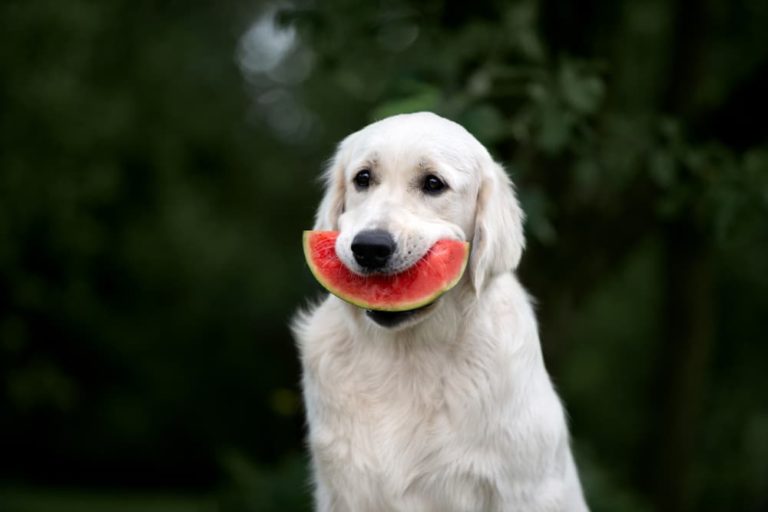Can Dogs Have Watermelon?

Watermelon is delicious any time of year, but there’s no doubt that it’s a summertime staple. The juicy fruit is a symbol of the season and is often a dish included at picnics and cookouts alike.
So if you have a pup that’s begging you for a piece, you may be wondering: can dogs have watermelon? And is watermelon good for dogs? Before you feed them a slice, keep reading to learn all about dogs and watermelon.
Can Dogs Eat Watermelon?
Yes, your pup can enjoy a bit of watermelon.
“It is perfectly fine for dogs to eat small amounts of watermelon as a low calorie treat,” says Dr. Joseph J. Wakshlag, professor of clinical nutrition and sports medicine & rehabilitation at the Cornell University College of Veterinary Medicine. “Let’s remember that dogs should get less than 10 percent of their overall calories from any treat in general so as to not lead to imbalances in their diets.”
Can Dogs Have Watermelon With Seeds?
Seedless watermelon is probably your best bet, but if you choose a watermelon that’s packed with seeds, it’s usually okay to still feed it to your pup. It all depends on the type of seeds in the watermelon and how many seeds there are.
“It’s best to remove seeds, as they are hard to digest and can cause stomach upset,” says Dr. Gabrielle Fadl, director of primary care at Bond Vet. “If a large amount of seeds is ingested, they could even cause an intestinal obstruction. This applies more to the hard, black seeds rather than immature (soft, white) seeds, although either can potentially cause an issue if too many are ingested.”
However, if you have a larger dog, obstructions are less likely to occur from seeds.
“Obstructions from seeds are unlikely to ever occur in larger dogs over 20 pounds. But if you can, I would avoid them so as to not cause GI upset,” adds Dr. Wakshlag.
Can Dogs Have Watermelon Rind?
While the flesh of watermelon is okay to give to your dog, do not give them rinds.
“The biggest issue is the rind – we have seen more than one dog who has gotten into the rind and eaten chunks of it develop obstructions or vomit up the chunks since they are very hard to digest,” explains Dr. Wakshlag. “This is a summer picnic hazard for sure – keep the rinds in the compost bin and away from your dog, in general.”
Dr. Fadl adds that in addition to GI issues, watermelon rinds can also be a choking hazard for your pup.
Can Puppies Eat Watermelon?
Your puppy can also enjoy watermelon, but just pay attention to the seeds and the overall amount of watermelon you’re feeding them
“In general, puppies can have a small amount of treats (less than 10 percent of their daily calorie intake), which could include dog-safe fruits or veggies,” says Dr. Fadl. “However, puppies are smaller than adults and their bodies (including their digestive systems) are still developing. It might be best to stick with very small amounts, so they don’t fill up on watermelon and then skip their nutritionally balanced puppy food, and to avoid offering a lot of new foods in a short time frame as that could cause stomach upset.”
Dr. Wakshlag also notes that puppies may have a harder time than larger dogs digesting seeds, so it’s best to take them out.
Benefits of Watermelon for Dogs
Feeding your pup watermelon does have some added health benefits, like extra hydration in warm summer months.
“The high water content can certainly contribute to hydration, especially in the summer or when a dog is being active,” says Dr. Fadl. “Watermelon also contains a lot of nutrients, but is low in calories. All of this can potentially make it a great treat – but again, in moderation.”
Precautions When Giving Dogs Watermelon
To reiterate, you should always avoid feeding your pup watermelon rinds, and be sure to keep the seeds to a minimum.
“Remove the rind prior to giving watermelon to your dog. Also remove as many seeds as possible (especially the mature black seeds),” says Dr. Fadl.
And if you are thinking of feeding your pup anything watermelon flavored (not the fruit itself), take extra caution.
“Watermelon flavorings can be totally different from the actual fruit and might contain toxic ingredients like xylitol,” says Dr. Fadl. “The information here about feeding watermelon to your dog applies solely to the actual fruit.”
If you have any concerns about feeding your dog watermelon, be sure to get advice from your veterinarian. “When in doubt, check with your vet. Although watermelon is safe for most dogs, there are always individuals who might not tolerate it,” says Dr. Fadl. “The fruit’s sugar content could make it less than ideal for diabetic dogs. And dogs with food allergies or sensitive stomachs should have a systematic method for introducing new foods, so a pet owner can know what does and doesn’t cause their symptoms to flare up.”
How to Give Dogs Watermelon
Planning to serve your pup some watermelon at your next summer shindig? Check out these simple tips.
Size accordingly. Dr. Fadl suggests that you cut the watermelon into chunks in a size that’s easy and safe for your dog to chew (based on their body/mouth size) while also removing the rind and as many seeds as possible.
Freeze it up. “It’s also possible to freeze chunks of watermelon, or to puree it and freeze it into ‘pupsicles’,” says Dr. Fadl. “There might be additional fun, dog-friendly recipes online – just be sure to double check that all ingredients are safe for dogs.”
Dogs and Watermelon: The Verdict
As long as you’re taking the correct precautions, your pup can safely enjoy a piece of watermelon every now and then, according to Dr. Fadl. “For most dogs, a bit of watermelon as a treat from time to time is perfectly fine.”









